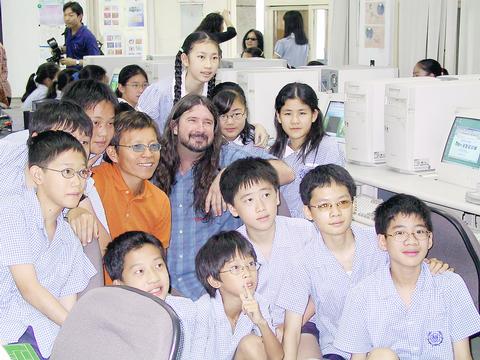With earthquakes, transportation accidents, floods and rising unemployment rife in Taiwan in recent years, local residents could be forgiven for ignoring issues effecting places far from home.
As the temperature rises and the water shortage continues, however, thousands of the nation's residents have recently taken the time to voice their concerns regarding oil and gas exploitation in the far-off Alaskan Arctic National Wildlife Refuge.

PHOTO COURTESY OF AUSTIN PENG
While US President George W. Bush was busy shoring up friendships in Europe earlier this week, he certainly wasn't making any new friends in Taiwan. Instead, he was receiving thousands of e-mails asking him to reassess his controversial energy bill courtesy of the first Chinese-language Web site aimed at bringing the environmental problem facing the arctic region to the attention of the Chinese-speaking world.

Called simply www.savetheland.com.tw, the Web site was the brainchild of popular Yukon-based new age musician, Matthew Lien -- an artist with an immense following in Taiwan, and record company copywriter, Austin Peng (彭李康).
Along with offering the Chinese-speaking world an overview of the issues surrounding the arctic refuge, the site also enables those concerned to send an e-mail letter composed by Lien to the White House at the press of a button.
"The idea was first brought up three years ago when Matthew became involved with the Magao National Park project," Peng said. "With Taiwan's entry into the WTO earlier this year, however, we felt that it was the perfect time to launch the site as people are now beginning to pay attention to places and issues not only in Taiwan but around the world. After all, WTO has meant that Taiwan is now a true part of a global community and issues affecting one continent now affect Taiwan."
Located on the US/Canada border, where Alaska and the Yukon meet the Beaufort Sea, the refuge was originally established by President Eisenhower. In 1980 it was expanded to 19-million acres -- 84 percent of which is designated part of the National Wildlife Preservation System.
The area is home to an impressive variety of arctic wildlife. Wolves, muskoxen, snow geese and porcupine caribou share the environment with 160 species of birds, 35 other kinds of land mammals, 9 species of marine mammals and 36 types of fish -- all of which live in relative harmony with the native Gwich'in people, who have called the region home for 12,000 years.
For some, though, the appeal of this icy Eden lies far beneath its soil. Multinational oil companies discovered huge oil and gas reserves buried deep under the area's fertile earth nearly 20 years ago.
"Although the argument over drilling rights in the refuge isn't a new development, Bush's recent energy bill made it a worldwide issue. English-language Web sites have enabled millions of people to e-mail the White House and voice their concerns, but there was nothing in Chinese," Lien said. "By setting up the site people not only in Taiwan, but also in China have an opportunity to learn about the area and the issue in their native language."
To date upwards of 5,000 e-mails have been sent to the White House since the site went online four days ago. And organizers expect many more to be sent as news of the site spreads.
"The feedback and interest we've received has been outstanding. Thousands of people in Taiwan have voiced their opposition to the plan by sending the letter to the Bush administration," Lien said. "And with the site being in Chinese, people in China can also contribute to the international call for a change in energy policy, which means that literally millions of people can voice their views on the matter."
Although the area lies thousands of kilometers from Taiwan, Legislator Apollo Chen
"Just because people in Taiwan have never seen the animals and don't know much about the place doesn't mean that what goes on there doesn't affect them," Chen told the Taipei Times. "The effects of oil and gas exploitation in the area will have global repercussions and affect us all, regardless of where we come from. It's not something that should be ignored simply because it is far away."
According to Lien, who has been at the forefront of the plan to develop Taiwan's seventh national park for three years, problems facing the arctic region are not that far removed from those surrounding the development of Magao National Park
"The issues may seem alien to Taiwan on the surface, but resource management, conservation, Aboriginal cultures and environmental protection are all issues being faced here at present, especially in the Magao area," Lien said. "As residents of the Earth, we should not look at one such issue and ignore others simply because they are taking place thousands of miles away. Such issues are all related and they affect us all regardless of where we live."

On April 26, The Lancet published a letter from two doctors at Taichung-based China Medical University Hospital (CMUH) warning that “Taiwan’s Health Care System is on the Brink of Collapse.” The authors said that “Years of policy inaction and mismanagement of resources have led to the National Health Insurance system operating under unsustainable conditions.” The pushback was immediate. Errors in the paper were quickly identified and publicized, to discredit the authors (the hospital apologized). CNA reported that CMUH said the letter described Taiwan in 2021 as having 62 nurses per 10,000 people, when the correct number was 78 nurses per 10,000

As we live longer, our risk of cognitive impairment is increasing. How can we delay the onset of symptoms? Do we have to give up every indulgence or can small changes make a difference? We asked neurologists for tips on how to keep our brains healthy for life. TAKE CARE OF YOUR HEALTH “All of the sensible things that apply to bodily health apply to brain health,” says Suzanne O’Sullivan, a consultant in neurology at the National Hospital for Neurology and Neurosurgery in London, and the author of The Age of Diagnosis. “When you’re 20, you can get away with absolute

May 5 to May 11 What started out as friction between Taiwanese students at Taichung First High School and a Japanese head cook escalated dramatically over the first two weeks of May 1927. It began on April 30 when the cook’s wife knew that lotus starch used in that night’s dinner had rat feces in it, but failed to inform staff until the meal was already prepared. The students believed that her silence was intentional, and filed a complaint. The school’s Japanese administrators sided with the cook’s family, dismissing the students as troublemakers and clamping down on their freedoms — with

As Donald Trump’s executive order in March led to the shuttering of Voice of America (VOA) — the global broadcaster whose roots date back to the fight against Nazi propaganda — he quickly attracted support from figures not used to aligning themselves with any US administration. Trump had ordered the US Agency for Global Media, the federal agency that funds VOA and other groups promoting independent journalism overseas, to be “eliminated to the maximum extent consistent with applicable law.” The decision suddenly halted programming in 49 languages to more than 425 million people. In Moscow, Margarita Simonyan, the hardline editor-in-chief of the